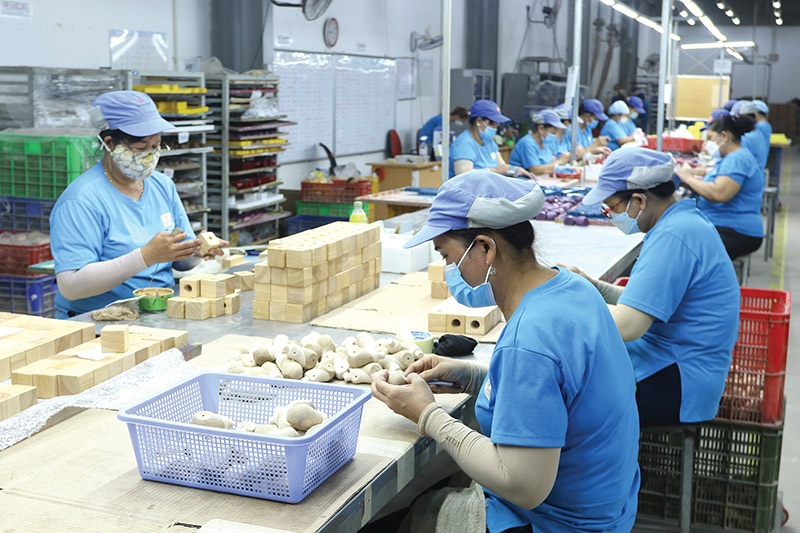Foreign groups battle to retain their workers
Inadequacies in salary are causing a shift of workers among foreign-invested enterprises. Taiwanese-backed Foxconn, the world’s largest iPhone contract manufacturer, is complaining about a battle to attract more affordable labour with its Chinese rivals in Vietnam.
Young Liu, CEO and chairman of Foxconn, this month accused the company’s Chinese competitors of setting up campuses near its base in Vietnam to get closer to its workers.
Foxconn’s campus, located in the northern province of Bac Ninh, currently employs around 60,000 workers, and the company has plans to increase that number over the next two years. Once the battle for workers becomes more serious, the company may face the risk of employee shortages.
While the Foxconn CEO would not disclose the names of the competitors involved, the current crop of 31 companies – employing around 160,000 workers – that produce Apple products in Vietnam include major names such as Luxshare ICT, Pegatron Vietnam, and BYD Electronics Vietnam.
 |
| Foreign groups battle to retain their workers--illustration photo |
Some workers have noted that Luxshare ICT wages are slightly better than what they were on previously, hence the shift occuring between companies in more recent times. Do Van Binh, a local of the northern province of Bac Giang, this year decided to leave Foxconn to work for Luxshare with the expectation of getting a higher salary.
Binh said that the basic salary offered by Luxshare ICT is around $215 per month. Workers are also provided additional assistance each month that includes $20 for housing, $13 for fuel, $9 to support workers working in a toxic environment, and more.
“Meanwhile, at Foxconn the basic salary is about $20 less per month, with the other assistance a few dollars lower too,” Binh said.
Many other Vietnamese workers are living in narrow circumstances due to low incomes, an issue that was addressed last week by Vietnam’s top leaders.
In last week’s livestream between Prime Minister Pham Minh Chinh and around 4,500 workers based up and down the country, around 10,000 questions were submitted as well as proposals focusing on 10 groups of general problems.
Notably, workers are hopeful regarding the minimum wage increase from July 1, while many also gave comments about adjustment to social housing and social insurance policies, improving professional qualifications and skills, and solving problems related to implementing preferential policies for workers that have suffered from COVID-19.
Measures to ensure jobs, income, and loan support for workers were also discussed, and so were inspections of employers that violated labour regulations by not signing contracts with workers, not paying salary or social insurance, and not ensuring safety and hygiene.
Ensuring a stable living standard for workers is the government’s leading concern. On June 12, the government promulgated Decree No.38/2022/ND-CP on prescribing statutory minimum wages paid to employees working under employment contracts. The regional-based minimum wage will officially increase by 6 per cent from July 1.
Some companies have pointed out, however, that wage increases will increase costs and disrupt business plans for the year. Representatives of the Vietnam Chamber of Commerce and Industry stated that they had expected increases from January 2023 rather than earlier, while smaller enterprises have complained that the wage hike will increase human resources costs and become an extra burden due to reduced revenues already being suffered.
Increased external risks thanks to lockdowns in China and the Ukraine conflict have also resulted in skyrocketing prices of raw materials and commodities, in turn damaging business budgets. Some employers have stated that their labour costs would increase at a minimum of 10 per cent
Truong Tien Dung, vice chairman of the Ho Chi Minh City Food and Foodstuff Association, believes that the rise in wage bills would be passed on to product prices, fuelling inflation.
“Businesses have been put into a difficult position because it was not compulsory to raise wages for those workers who had been paid above the minimum level. However, if employers do not pay more during a wage rise, they may face dismay from the workers, resulting in dissatisfaction,” Dung said.
Another risk for workers is potentially becoming embroiled in black-market loans.
Tran Thi Toan, trade union staff at Taiwan-headquartered New Apparel Far Eastern Vietnam Co., Ltd., noted that this is a common issue in many areas. “Many workers have been mired in financial difficulties but have been unable to get loans from banks, forcing them to get black-market lending.”
Loan sharks usually entice workers to borrow money directly or through applications or social networks with unusually high lending rates, which is an average of 90-100 per cent per month and even up to 700-1,000 per cent per month. “When workers fail to pay on the due date, they are threatened,” she said.
Located in the southern province of Binh Phuoc, New Apparel Far Eastern provides more than 3,000 jobs for local people.
| Pham Minh Chinh, Prime Minister
The Party, the government, and local people’s committees will pay attention to taking care of workers, by developing and issuing policies catering to their needs that have yielded important results over the years. Recent conversations are an effort to continue what has been done and an important event since in-person interactions between leaders and workers were limited in the last two years. The 13th National Party Congress’ goal is to turn Vietnam into a developed, high-income country by 2045, and workers play an essential role in this process. Vietnam determines that human resources training is one of the nation’s strategic breakthroughs for rapid development, thus the government issued a career development strategy for 2030. The Party, the government, and the entire political system, including the General Confederation of Labour, will always listen to understand concerns and review and refine related mechanisms and policies to ensure needs are met. I hope that workers continue to contribute to the country’s development, just as previous generations have done. The government will ask local authorities at all levels and sectors to continue to collaborate with the trade unions to help resolve issues of workers. One of the leading concerns is to improve the labour force’s quality. Thus, along with the workers’ effort, the related authorities need to mobilise the power force and facilities for training programmes. The government has assigned the Ministry of Labour, Invalids and Social Affairs and the Ministry of Planning and Investment to allocate VND2 trillion ($87 million) for vocational training. The government will consider financing a part of the bailout package for economic recovery to train workers. Dao Ngoc Dung, Minister of Labour, Invalids, and Social Affairs
Vietnam is suffering pressure on jobs, vocational training, and retraining for workers because the International Labour Organization forecasts that by 2026, about 40 per cent of workers will not meet the demand for job skills, and 30 per cent of workers will be laid off. Thus, we must prepare to train the skilled labour force for the next five years and beyond, which also matches with the spirit of the resolution of the 13th National Party Congress. In order to improve human resources quality, my ministry will submit to the government to amend the Law on Employment in the spirit of determining which industries and fields are required for employers to use skilled workers. Businesses will have to cooperate with the state to train the unskilled labour force before recruiting them. Regarding the high-quality labour training direction, we will spend the majority of the $87 million package to build three national training centres to train new occupations. Besides this, the ministry will continue to implement pilot training programmes using over 30 textbooks imported from high-quality schools in Australia and Germany. |
What the stars mean:
★ Poor ★ ★ Promising ★★★ Good ★★★★ Very good ★★★★★ Exceptional
Related Contents
Latest News
More News
- Kurz Vietnam expands Gia Lai factory (February 27, 2026 | 16:37)
- SK Innovation-led consortium wins $2.3 billion LNG project in Nghe An (February 25, 2026 | 07:56)
- THACO opens $70 million manufacturing complex in Danang (February 25, 2026 | 07:54)
- Phu Quoc International Airport expansion approved to meet rising demand (February 24, 2026 | 10:00)
- Bac Giang International Logistics Centre faces land clearance barrier (February 24, 2026 | 08:00)
- Bright prospects abound in European investment (February 19, 2026 | 20:27)
- Internal strengths attest to commitment to progress (February 19, 2026 | 20:13)
- Vietnam, New Zealand seek level-up in ties (February 19, 2026 | 18:06)
- Untapped potential in relations with Indonesia (February 19, 2026 | 17:56)
- German strengths match Vietnamese aspirations (February 19, 2026 | 17:40)



 Tag:
Tag:




















 Mobile Version
Mobile Version